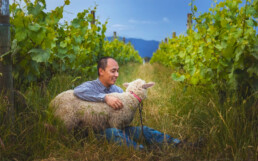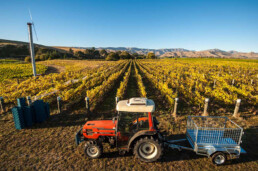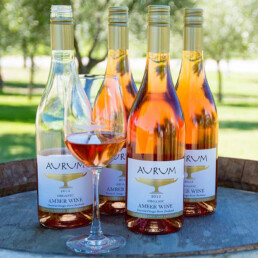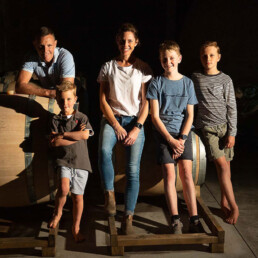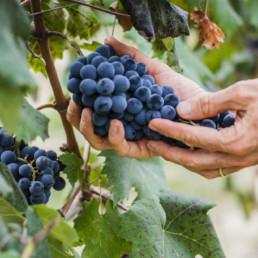Folium Vineyard: An Unrelenting Artisan
On the 10th Anniversary of Folium Vineyard, we invite you all to raise a celebratory glass of fine Folium wine to toast to the remarkable man behind the wine and his fascinating wine journey….
What do you get when you mix Japanese sensibilities, U.S oenological training, Old World wine techniques and primo NZ dirt? You get this month’s Wondermaker: Folium Vineyard’s Takaki Okada crafting supremely elegant and complex vinous jewels. These wines are made in Marlborough by a Japanese winemaker who reveres the intricacies of French Old World wines and with his American schooling he cleverly wrests magical liquid from his Brancott Valley vines.
To fully understand the sublime beauty of Folium Vineyard wines we shall momentarily delve into the immensely likeable character of the artisan winemaker/viticulturalist, Takaki Okada. He is a one-man band doing everything by hand – he is at once a meticulous, obsessive and a details-oriented, passion-driven perfectionist. And rather witty to boot! So, how did he end up so far from his northern hemisphere home?
The Background Story:
Takaki Okada was born and raised in Tokyo, Japan. An unusual starting point for someone to become enamoured with creating fine wine you may think. Perhaps not so unusual. Takaki sees a parallel between Japanese cuisine’s quest for allowing perfect ingredients to sing with the deft touch of a master chef to that of a winemaker’s stewardship of his vineyard producing quality fruit to craft the purest expression of terroir. Although, Takaki also sees his lack of wine heritage as a benefit, a blank canvas with no predisposed ideas as to how one “should” make wine.
He chose to study at what many consider to be one of the world’s best oenology and viticulture wine programmes – U.C. Davis in California. Along the way he fell in love with NZ Pinot. This proved to be the springboard for moving to Marlborough in 2003.
For 6 years he worked as vineyard assistant then manager for Clos Henri in Renwick, Marlborough. The owners are the 10th generation acclaimed winemaking Bourgeois family from Sancerre, France. This further cemented his ideas of integrating Old World knowledge and techniques with the unique New World terroir.
By 2011 Takaki was ready to go it alone. He established Folium which was an organically certified vineyard site originally planted in 1996 and managed by Fromm Winery. Unlike most of Marlborough, Folium is a really small-scale vineyard operation with only eight hectares in the Brancott Valley.
Takaki named his winery Folium after the Latin word for leaf. Although he is the winemaker, he says “the leaf is doing all the photosynthesis and all the goodies for the fruit” – so the hard work is really done by the vines. Considering that the Folium vineyard is completely dry farmed (only newly planted young vines are irrigated), these vines are working very hard indeed.
The Vineyard Philosophy:
The decision to dry farm is one that Takaki made as he wanted to get a true reflection of his terroir and the variations of each vintage. He said, “vineyards with regular irrigation produced similar wines each year” and while most large producers strive for consistency, he wanted to “reflect the opposite”.
Also, without irrigation the vines do not develop as much leaf canopy, meaning way less Methoxypyrazines in the developing grapes. This gives a style of wine that is different to most others in the area – definitely not your classic herbaceous Marlborough savvy. Folium wines are taut and nuanced with greater length.
How Dry Farming Works:
When the vine is irrigated the root system stays where the water is. When the roots are forced to seek out water they grow down into the subsoil to survive, and by doing so Takaki believes you get a true reflection of site and season.
Planted in 1996, the vines had previously been irrigated so when Takaki took over he had to risk challenging the vines by removing the water source they had previously relied on.
The first three years were challenging at Folium as the leaves yellowed as they battled to survive. But by 2014, the leaves finally turned green and the canopy was full; nature had found its way and the lack of intervention had forced the vine to first survive and finally, to thrive.
Takaki is quick to point out that he will irrigate if the circumstances call for it, as they did during the extreme drought of 2016. “I dry farm, but I’m not stupid”, he quips.
The additional environmental benefit of dry farming is immense. Saving the precious commodity of water. According to the study by New Zealand Winegrowers, average irrigation in 2014/2015 vintage was 660 Litres per vine. If it is a normal vineyard with 2,000 vines to the hectare, it requires 1,320,000 L/ha. In most of the Folium vineyard it is closely planted at 4,000 vines/ha! That would be a huge drawing of water from rivers or aquifers. Nowadays, it is every wine producer’s challenge to be environmentally sustainable.
The Folium Terroir:
As we all know, the climate in Marlborough is perfectly suited to growing premium Sauvignon Blanc and Pinot Noir. With the wide diurnal temperature range during the growing season, fruit can retain higher natural acidity while accumulating aromatics and flavour components – just what NZ is famous for.
The Folium soils were created by ancient glacial action and old river systems. It is a mixture of clay and silt soil on the top layer (60cm) with shingles and larger stones. Low vigour clay-based soil in the ‘Southern valleys’ tend to retain sufficient moisture during dry summers to balance the growth of the vines.
It is Takaki’s belief that winemaking starts in the vineyard. Detailed care in the vineyard starts with pruning in the winter, followed by canopy management, such as shoot and bunch thinning, and leaf plucking during the summer, all the way to hand harvesting at optimum ripeness in the autumn. Different management takes place for different clones or vine ages to match their needs.
The Wines:
By using “time-honoured wine making techniques Folium strives to produce quality wines that express the unique nature of the Folium Vineyard”. (Folium website)
Since arriving in Marlborough Takaki has fallen in love with Sauvignon Blanc. He describes Folium Sauvignon Blanc as having Marlborough flavour but with the French texture he admires. He strikes an energetic balance between modernity and tradition. We can look forward to some seriously seductive chardonnay in 2021, not to mention his new release of Pinot Rosé with a smidgeon of Malbec for sensual texture. Takaki shows us he has an unrelenting artisanal touch when crafting all these wines. With his perfection-seeking eye gently referencing the fine French wines of Sancerre and Burgundy.
Both the Sauvignon Blanc and Pinot Noir are hand harvested and everything is destemmed. Since 2014 Takaki has been experimenting with wild yeast fermentations which has since become standard practice for him. His outstanding Pinot Noirs are mostly from his own vines, supplemented by a small amount of biodynamic certified fruit bought from a neighbour for the regular bottling.
The Pinot Noir is fermented in open top fermenters with indigenous yeast, and it is pumped over for 2-3 minutes a day with no plunging, which is just enough to get gentle extraction. There’s no cold soak but the grapes are picked in the early morning so fermentation takes a while to get going. The pinot is pressed to French oak, between 20-33% new depending on the vintage. Generally they show the bright red fruit found in many Pinot Noirs from Marlborough but with the added complexity of savoury, earthy notes and a truly fine textural element.
Across the range these are very precise, exuberant high-quality wines with wonderful purity of fruit and distinctive concentration. These are certainly wines with character and personality – just like their winemaker who truly embodies our Dhall & Nash Wondermaker profile: “…those who create wonders by patiently toiling and knowing their small piece of earth…” with dedication, soul and passion.
Happy 10th Anniversary, Okada-San!
An Interview with Takaki Okada…
Here we have a few questions for winemaker and owner, Takaki Okada, to provide a deeper insight into his meticulous work and the resulting supremely elegant wines..
How and when did your love of wine start?
“I started living alone when I started university in Japan away from my hometown. I loved cooking, and I found wine can change or enhance the flavour of dishes. That was when I was fascinated by wine for first time.”
What was your impetus and motivation to go it alone to create Folium Vineyard in 2011? And why in NZ which is such a long way from Japan?
“I studied viticulture in California from 2001 to 2003. I learnt theory there but had not done any practical side of wine production. I came to NZ in 2003 to learn how to be practical in vineyard and winery with my working holiday visa. I started working with Clos Henri in 2003 and became their Vineyard Manager in 2006. By that time, I was in love with the region and this beautiful country. When I first came to NZ, I did not think I am going to stay here that long, but I believe I made a good choice.”
Do you feel that your Japanese culture has any underlying influences on your viticultural or winemaking methodologies?
“The philosophy of Japanese cuisine is praising the quality of ingredients. When you think about Sashimi, it can be simple, but chefs spend a lot of effort to maximize the flavour of each fish during the preparation. I think my winemaking got a similar idea that I would like to produce the best fruit in the vineyard, and carefully working in the winery to keep the beauty of the fruit.”
Organics and dry farming is a big part of your winemaking philosophy – is this more about striving to get the purest expression from the grapes or is it about sustainability and ecological awareness? ?
“There are our four main reasons why we are dry farming:
- Express Vintage Variation
Rain patterns through the growing season is one of the most important factors to shape the characteristic of the vintage. - Produce Wine with Different Style
Reducing irrigation can change the shape of canopy. This will enable us to create unique wine with different style. Less Methoxypyrazines, more sunshine to bunch, concentration. - Express the terroir of Folium Vineyard
Roots system have to develop more if they only rely on rainwater. We believe we can express the site when vines have larger root systems. - Environmentally Friendly
Average water consumption for 1ha vineyard in Marlborough is 1,650,000L/ha/year. Dry farming can save all this water.”
How would you describe your style of winemaking?
“Our philosophy of winemaking starts in the vineyard. We have been challenging dry farming, organics to produce fruit which represents a piece of the land where Folium Vineyard is located. When we have these fruit representing the terroir, we don’t want to put too many fingerprints by working too much in the winery.”
What do you love about working with the Sauvignon Blanc grape?
“Sauvignon Blanc can have several different styles, all the way from dry to sweet. New Zealand invented their own style since ’70s. I would like to know how the Sauvignon Blanc can be when we follow the more traditional old world style of Sauvignon Blanc.”
What is your preference, or not, for the use of oak in your Sauvignon Blancs?
“We have never used new barrels to our SB. We sometimes use old barrels just in case when we have more juice than the capacity of tank. I have to admit it is always fun to see how these wines in the barrel evolve. These wines never make more than 5% of wine.”
What Pinot Noir clones do you have in your vineyard? Are there a few special rows of vines that go into your Reserve Pinot Noirs?
“Our Reserve PN is always from our original planting back in 1996. This block is one of the oldest blocks planted with Dijon Clone which arrived in NZ in mid-90’s. We have mixture of different Dijon Clone 114, 115, 667, and 777 along with Clone 5 and little bit of Abel.”
How do you rate the 2019 vintage at Folium?
“2019 was the year of drought in Marlborough. It was so dry that irrigation scheme turned off during the growing season. I remember some of the vines just wilted 10days after the scheme was turned off. On reflection, in the Folium Vineyard, we did see some water stress but the vines could handle the drought conditions without irrigation. I am very proud of what these vines did in 2019. The wine is showing great concentration, but still lovely and fresh at the same time.”
Who, or which winery, has influenced and inspired your winemaking style and why?
“Hätsch, winemaker of Fromm is who I respect the most in the industry. His passion and dedication to the detail is something which I always admire.”
Recently Dr Jamie Goode (Wine Anorak) raved about your quality chardonnay grapes that Corofin used for their own bottling. Any chance we will see larger quantities of Folium chardonnay available for all us chardy lovers?
“We are planning to produce few extra barrels of Chardonnay from 2021. They will be available in 2023 hopefully. I am also excited with this new challenge.”
What do you and your friends like to drink on a night at home?
“Starting with Champagne, it if is Billecart Salmon that is perfect. Then moving to something interesting, i.e. new varieties, smaller appellation, interesting winemaking techniques, etc. Coming back to White and Red Burgundy, and finish with Champagne again. This is my dream dinner with my friends.”
Your helpers in the vineyard are mainly of the four-legged variety – how many pet sheep and goats do you now have?
“I have 4 sheep and 2 goats at the moment. They are our residential landscape designers and are great escapers as well. 
Thanks so much for your time. And for making divine vinous gems for us at Dhall & Nash and for your avid fans to proselytise about and enjoy!
Keep up the good work and happy 10th anniversary, Takaki-San!
